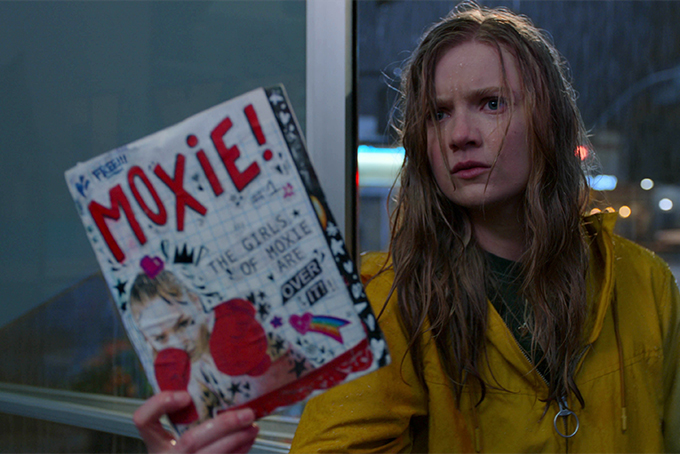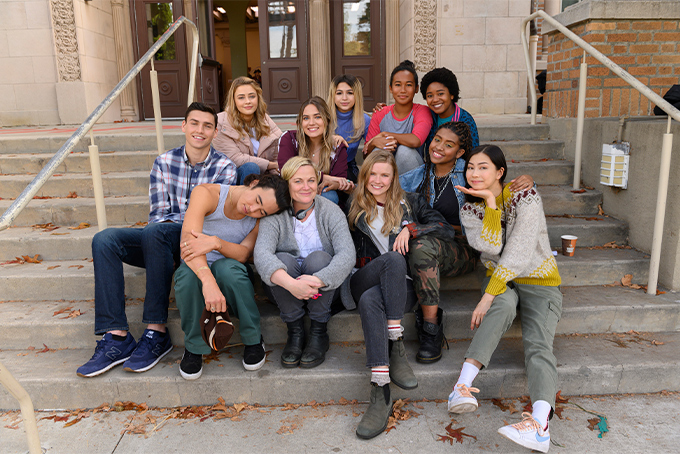As an onscreen mother-daughter duo, Amy Poehler and Hadley Robinson are a match made in heaven. The former, a 49-year-old Massachusetts native, has been heralded as a comic genius ever since she joined the cast of Saturday Night Live (1975 to present), birthed memes as a “cool mom” in Mean Girls (2004) and won a Golden Globe for playing the overachieving Leslie Knope in Parks and Recreation (2009 to 2015). Her 26-year-old Vermont-born co-star, meanwhile, appeared in Little Women (2019) and I’m Thinking of Ending Things (2020) as she geared up for her big break.
It comes in the form of Moxie, a socially conscious high-school comedy also directed by Poehler, in which Robinson takes the lead as Vivian, a shy teenager who reassess her priorities after she meets Lucy (Alycia Pascual-Peña), a confident new student, and then discovers that her mother (Poehler) was part of the underground feminist punk movement riot grrrl in the 1990s. Taking a leaf out of her book, Vivian creates a zine that calls out sexism in their community and secretly distributes it to her peers. It sparks protests, campaigns and eventually a full-blown revolution.
To celebrate the film’s Netflix release on 3 March, we spoke to the actors about Poehler’s return to co-host the Golden Globes alongside Tina Fey, how the industry’s gatekeepers have changed post-#MeToo and why the process of making art is as important to them as the final product.

Moxie is based on Jennifer Mathieu’s novel of the same name. When did you first come across it and, Amy, how did you find Hadley, whose character, Vivian, is at the heart of the film?
Amy Poehler: “This was all developed in-house. Kim Lessing, a producer from my company, Paper Kite, came to me with the book. She said, ‘You should read it.’ I thought it’d make a great movie. We developed it with Jennifer and brought Tamara Chestna and Dylan Meyer on board to write the script. Vivian goes through a tremendous amount of change in the film and at the beginning, we see her observing everyone else. There’s a lot of internal [turmoil] she has to express. Hadley is incredible at that. She’s tender, curious and can do so much when she’s listening.”
Hadley Robinson: “Vivian’s superpower is her ability to absorb information. I first sat down with Kim Lessing and talked about the issues the script raised. Then, I auditioned and I was nervous but when I went into that room, I felt at home. And I thought, ‘I really want to collaborate with Amy!’”
Amy, you’ve described Moxie as a “coming-of-rage story”. What does that mean to you?
AP: “There’s often a very patriarchal way to tell a story. Usually, there is an outlier—a person who knows what they want and bulldozes their way through. But, I’ve always been drawn to films that show people trying, in real-time, to figure out what they care about and what they’re going to do about it. Vivian lights the match and that fire spreads. When I was prepping for this film, I put [the characters] on a spectrum in terms of where they were when it came to [affecting] change. Some, like Alycia Pascual-Peña’s character Lucy, are on the frontlines [but] for Vivian, it’s a big journey.”
HR: “One of the first things you said to me was, ‘I want this story to be messy. I don’t want Vivian to be perfect. She fails and hurts people sometimes and that’s OK.’ It’s all part of the process.”
Vivian is inspired by her mother’s riot grrrl past. Were you both fans of that movement?
AP: “I was a huge fan of the music and especially of Kathleen Hanna [lead singer of punk band Bikini Kill], but I wasn’t in that scene. I wasn’t cool enough. I was in the comedy world in Chicago in the 1990s and, of course, every comedian is obsessed with rock stars, just as every rock star thinks they’re a comedian [laughs]. As a gen-X-er, I was drawn to the nostalgia [of this story]. There’s a lot here that people my age or older will remember when it comes to what activism looked like in the 1990s, and what we got right and wrong. My dream is that women watch it with their daughters.”
HR: “I hadn’t heard of riot grrrl, Kathleen Hanna or Bikini Kill, so it was really fun getting to know the music and the history behind it all. I watched the Kathleen Hanna documentary, The Punk Singer [2013], and just fell in love with her. I think the music in this film will stick with people.”

How did the two of you perfect your mother-daughter bond before you started shooting?
HR: “One of our first meetings involved coffee, cookies and bonding over our love of binders. I had a binder with all my notes in it and Amy and I connected over that. We had chemistry [laughs].”
AP: “I felt genuinely maternal [towards] Hadley on set. I know what it can be like to be in every scene every day. It’s a lot of work and I had no doubt that she could do it, but I always wanted to make sure she was feeling rested and ready. I was blown away by the people I was surrounded by [on this film] and their mental health mattered to me. The process of making art doesn’t have to be chaotic or traumatic for it to be something special. That process is as important as the product. As we’ve been reminded this year, life is short. You should feel safe and supported when working.”
On that note, the feminist awakening that occurs at Vivian’s high school in Moxie mirrors the one that happened in the industry post-#MeToo. Have you seen it bring about real change?
AP: “A true activist never feels like we’ve gotten far enough, but over the past 20 years, I’ve seen things change in terms of the types of stories being told and the people telling them. Gatekeepers, the people making decisions about what gets made, are starting to change too, and that’s exciting. But one of the things that Moxie has taught me is that we have a lot to learn and, when we get older, we have things to unlearn. There are moments in the film, when Vivian tries to make things better but doesn’t realise the patterns she’s falling into [for instance, when she tells Lucy to ignore her bully]. So many of us can relate to that when we look back on our own behaviour.”
What impact do you hope the film will have on young women in particular?
HR: “The most important thing is that we start a conversation and plant the seeds for girls to empower themselves and their friends, and understand that we’re stronger together.”
AP: “I’d also like people to feel a little less alone in this lonely time. We miss our friends, our school hallways and the feeling of coming together. We’re in California and it’s been shut down for quite a while. I’m a pretty nervous rule follower so I haven’t really done anything or gone anywhere.”
But, Amy, you will be co-hosting the Golden Globes with Tina Fey. What can we expect?
AP: “Tina and I are going to be hosting from both coasts. Tina will be in New York and I’ll be in Los Angeles, so we’re going to have a lot of fun with that. We’re also going to try to raise some money for important causes. I have no idea how the Golden Globes are actually going to be handed out. Who’s going to want to hand anybody anything [at the moment]? Maybe we could send [winners] an e-award that they just open up on email? [laughs] Luckily, those decisions are not left up to us.”
Moxie will be streaming on Netflix from 3 March 2021





